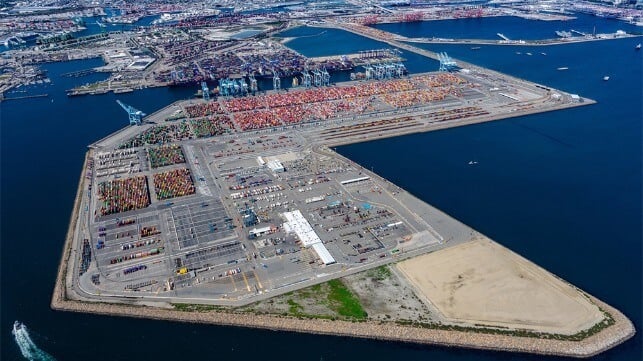Newsom Vetoes Ban on Public Funding for Automation at LA/Long Beach

Despite a lobbying campaign by the U.S. West Coast's powerful longshore union, California Governor Gavin Newsom has vetoed a bill to limit the powers of the air-quaility regulator for the twin ports of Los Angeles and Long Beach. The bill contained a provision to ban public funding for terminal automation technology in San Pedro Bay, which dockers believe to be a threat to their jobs.
Diesel air pollutants are harmful to health, and for decades San Pedro's fenceline communities and environmental regulators have pushed for improving air quality, with considerable success. The South Coast Air Quality Management District wants to get even more results by regulating equipment and mobile sources of emission within the ports, and has nearly reached a formal cooperative agreement with LA and Long beach on planning targets for zero-emissions infrastructure. That agreement calls for large-scale infrastructure upgrades, with electrification playing a key role. Since modern, electrified port equipment is often sold with high levels of automation technology, the cooperative air quality agreement would likely introduce more automation to the ports by default, which could be viewed as a threat to longshoremen.
To head off this problem, Senate Bill 34 (SB 34) proposed to ban the use of public funds to pay for automated or remotely controlled infrastructure at the San Pedro Bay ports. Public funds for buying human-operated, zero-emission equipment would still be allowed.
To ensure continued volume growth, the bill also proposed to ban the South Coast Air Quality Management District from capping cargo or cruise ship activity at LA and Long Beach.
The bill was opposed by environmental groups, shipping companies and community health advocates. SB 34 was supported by the ILWU, which organized a petition drive for its members to express their backing. The union's petition suggested that SB 34 "protects union jobs, prevents public funds from being used for automation, and keeps California's ports strong and competitive while still improving air quality."
Despite the union's pressure, Governor Newsom vetoed the bill, citing the advanced state of negotiations between the air quality district and the two seaports. "This bill interferes with this [cooperative] approach, the progress made, and the ongoing good faith efforts made by the [district] and the Ports of Los Angeles and Long Beach," the governor wrote.
The ILWU has yet to issue a formal response, but its East Coast sister union, the International Longshoremen's Association (ILA), released a statement condemning Newsom's "vicious attack" on dockers' jobs. ILA described Newsom's veto as a "gut punch" and a lost opportunity.
"By rejecting SB 34, the Governor has chosen the side of foreign ocean carriers and corporate lobbyists over the working men and women who keep California’s ports, and America’s economy, running," ILA wrote. "When a state uses taxpayer money to subsidize automation that replaces human labor, it’s not innovation, it’s corporate welfare. And when an elected official enables that process, it’s not leadership, it’s capitulation."
However, the Union of Concerned Scientists celebrated Newsom's veto as a win for air quality regulation. "SB 34 would have tied regulators' hands further, negatively impacting the health of millions of residents in surrounding communities, and hindering the region’s ability to reach mandated attainment of federal and state air quality standards," UCS said in a statement.
